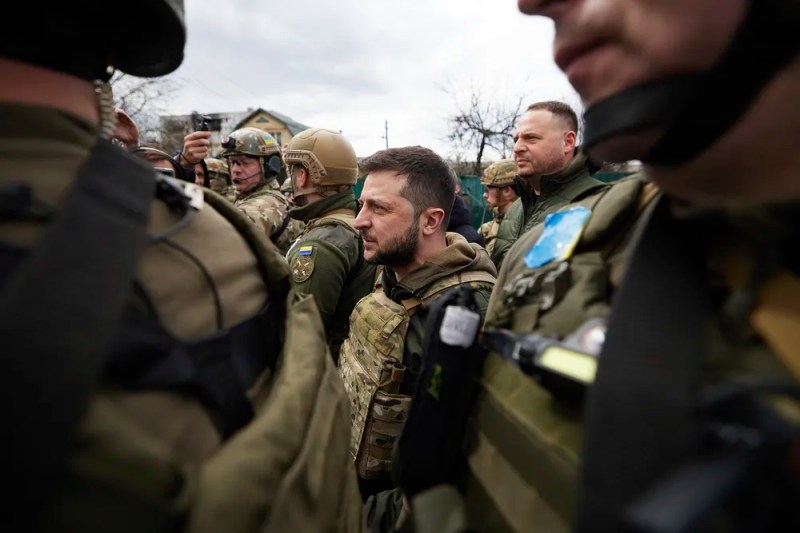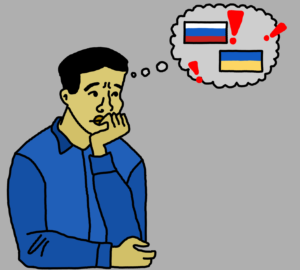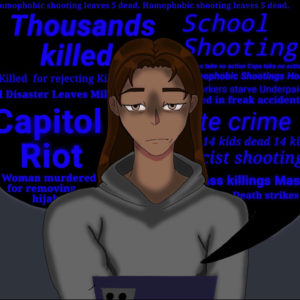Hope for Ukraine beats out apathy
rawpixel
Ukraine President Volodymyr Zelenskyy meets with journalists and local residents in the Ukrainian town of Bucha. Zelenskyy asserted that Ukraine would not stop until it reached victory in the Russia-Ukraine war.
December 15, 2022
On Feb. 24, my Honors Physics teacher started the class with a few announcements. One may have been about tweaks to an upcoming test. The other was about the outbreak of the Russia-Ukraine War.
“It’s okay to feel whatever you’re feeling about the war right now,” the teacher said. He referenced the craziness of it all, the first time in history of NATO activating its troops as the world watched Russian tanks roll across the Ukrainian border.
The teacher suggested news sources for us to follow: AP News, Reuters. He advised us to stay away from outlets like CNN and NYT which had political or financial stakes involved. The five or so minutes he took to inform us about the war struck me, as he was one of the few teachers I had who actually mentioned the war’s existence, let alone go as far as recommending actual, pragmatic actions we as students could take.
From that day on, I started checking AP News once or twice daily. For the first time, I learned about Ukrainian cities like the capital, Kyiv, and the port city of Mariupol. I read about missiles striking hospitals and saw screenshots of Ukraine President Volodymyr Zelenskyy, grizzled and dressed in a plain camo-colored tee, pleading for more planes, more aid, as he sheltered in an undisclosed bunker.
On Nov. 11, Russia completed its retreat from the Ukrainian city of Kherson. And with that retreat, now, more than ever, is time to pay attention to the news coverage of Ukraine. The question is no longer whether the war will be won, but whether we will care enough to witness the end of it. Our media is focused on one-hit wonders and flashy headlines. The Russia-Ukraine war is tough and arduous to follow, a disadvantage when keeping up public support.
“Coverage dominates until there’s a resolution or it becomes clear the conflict isn’t going to end quickly, and then the media largely moves on,” wrote Melissa Dewitte of the Stanford News Service.
However, our own physical distance from the war is no excuse for apathy. Dewitte goes on to mention that an unprecedented difference in access has allowed many international journalists to land in Ukraine from the get-go, allowing for continued coverage of the war. Zelenskyy himself makes extensive use of social media, so the world is in fact more privy to this war than we’ve been to many others.
Energy crises, gas prices and the geopolitical tensions of a Cold War 2.0 may come to bite the U.S. in the back. So yes, the war affects us. But what if we took the focus off of our own lives for a moment? What’s the baseline for starting to care for lives outside our own? It’s dangerously easy for us to take in the war from a distance, or even to ignore it altogether. Just wait for the headlines. Wait for the end.
Apathy is the baseline from which we all start. But we all have room to feel something about the war. And here’s a feeling that doesn’t require much baggage to hold: hope. Hope for Ukraine. Hope that they will win the war.
In truth, Kherson’s liberation is far from the end. The city continues to endure shelling from Russian forces who, unable to advance in the fighting, are determined to plunge the country into cold and darkness for the winter ahead. In the face of this, we can revive a hope and empathy for Ukraine that, like the country’s own grit, endures no matter how long the war takes.
As Ukraine continues its fight for a better future, one way to keep the empathy going on our end is to learn the individual stories behind the war.
Read about the lives of Ukrainians who need to rebuild their homes from the ground up, or about the young Ukrainian men who play a soccer match in the light of a car battery while the World Cup reigns on through a blackout. Watch a video from Karolina Zebrowska, the same history-fashion guru who mocked over-dramatic Facebook videos, on what it’s like to see Ukrainian refugees take up shelter in her building in Poland. Learn about Zelenskyy’s own history, starting from acting in the role of a history teacher-turned-president in Netflix’s charming and hilarious “Servant of the People,” and how the man who acted as president was elected in real life into Ukraine’s presidency.
It’s fully in our power to remain informed, not because it’s a duty but because it’s the least we can do. Ukraine isn’t giving up — why should we? So, reap hope from all the heartwarming and heartbreaking moments of the Russia-Ukraine War, but most of all be willing to search these moments out.
Here’s a start: AP News. Reuters.
Enjoy.






